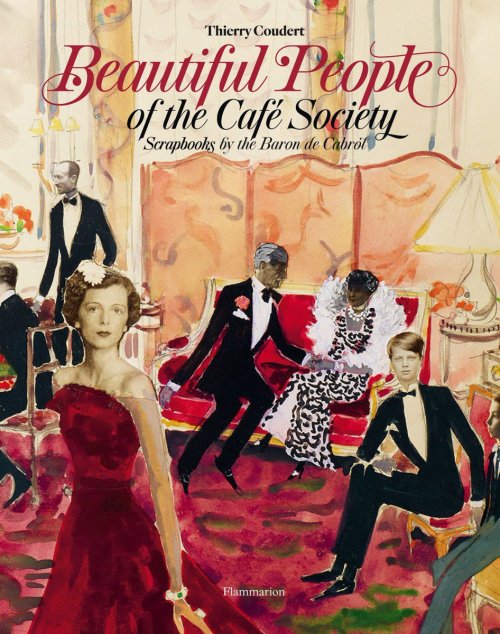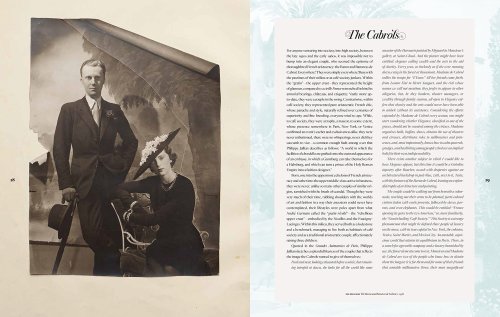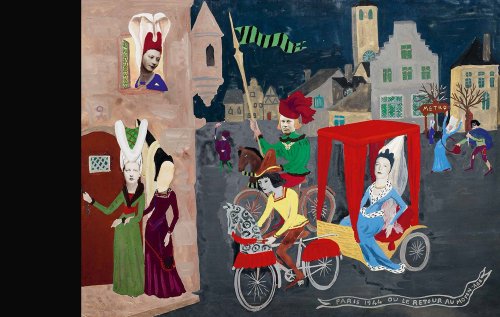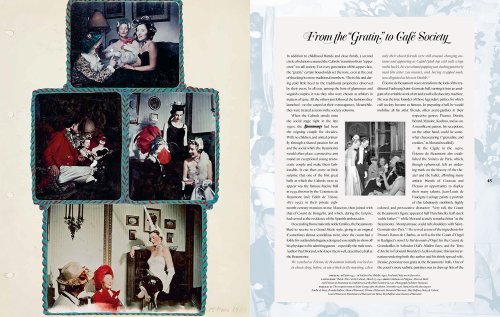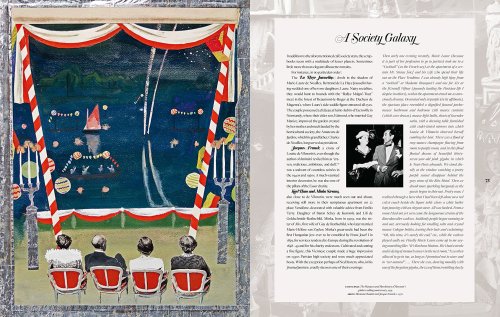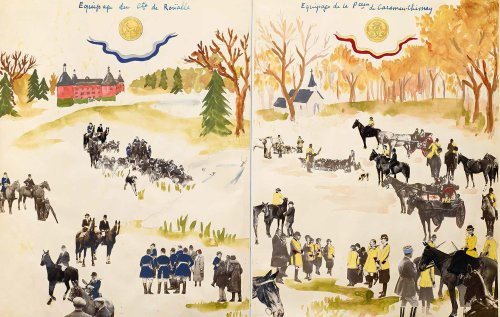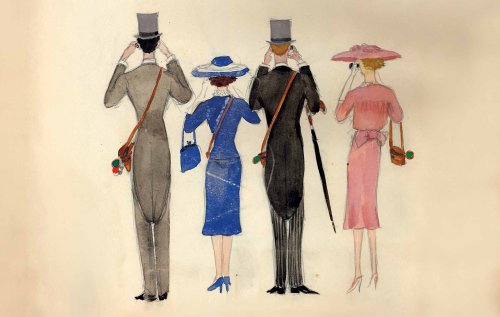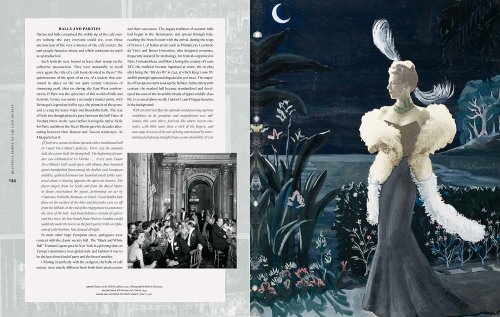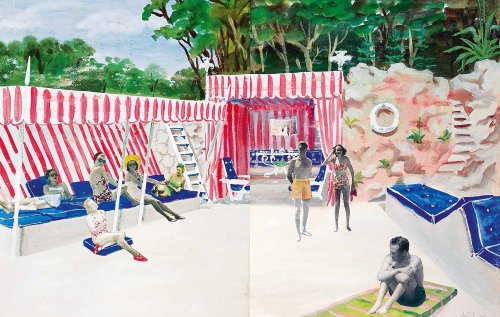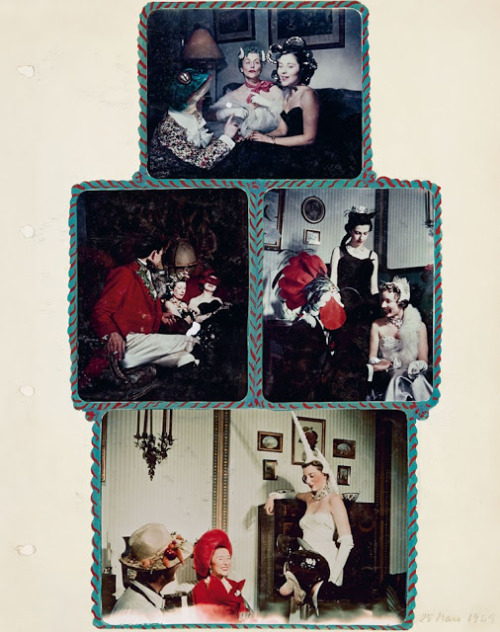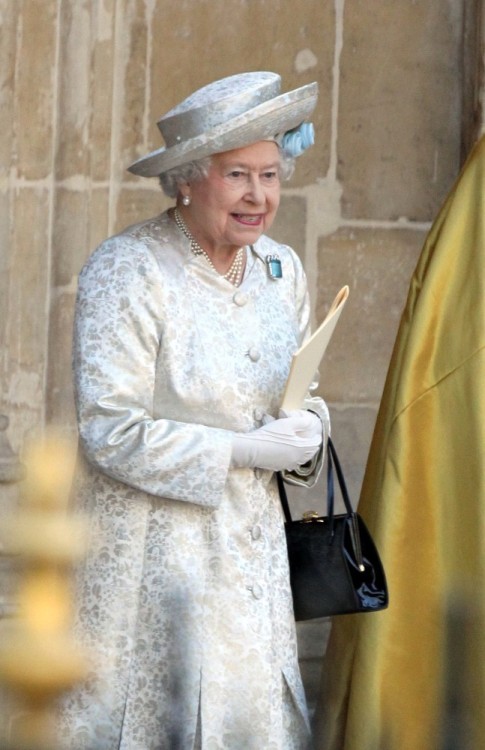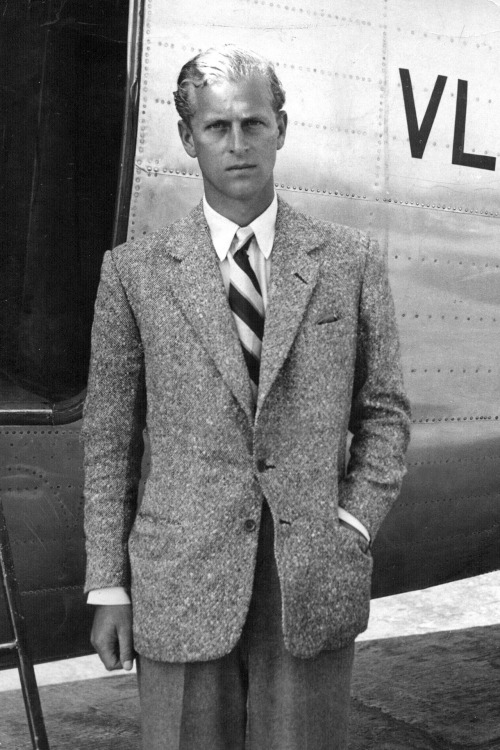#windsors

Either he beat the Russians single-handedly or David Attenborough made a documentary on the peacock.
Beautiful People of the Café Society
Scrapbooks by the Baron De Cabrol
Thierry Coudert
Flammarion , Paris 2016, 262 pages
euro 116,00
The glamorous aristocrats Daisy and Fred de Cabrol formed one of the most prominent twentieth-century high society couples on the international scene. Leading members of the exclusive café society, they socialized with the biggest names in the haut monde―from the Maharani of Kapurthala, to Queen Amelia of Portugal, to their close friends the Windsors. The couple attended every lavish ball of the era and was sure to catch the eye of fashion photographers such as Cecil Beaton at sumptuous parties thrown by Etienne de Beaumont or Marie-Laure Venice. The Winter Ball organized by the Baronne de Cabrol for her charity L’Essor, held at the Palais des Glaces in Paris, remains one of the most memorable and spectacular of the epoch. Reproducing pages from the scrapbooks crafted with beauty and wit by the Baron de Cabrol between 1938 and the 1960s, this volume reveals the privileged and extravagant world of the café society. Through collages, watercolors, and previously unpublished archival documents, readers will discover the exceptional journey of a couple who were at once actors and observers in a golden age of elegance and art.
L’arabesque La Librairie
Largo Augusto angolo via Francesco Sforza , 20122 Milano
tel 39.02.781104
mail : [email protected]
web: www.larabesque.net
instagram larabesquelalibrairie
facebook L'arabesque Cult Store & Cafè
Post link
One of mine, written in 1997, updated today.
It is so far a truism that revolution devours its children that we have failed to recognise, in the present plight of the House of Windsor, that monarchy does so just as voraciously. The fact is that revolution and monarchy devour their children for the same reason - both represent a tyranny which is inimical to the “freedom of the children of God” (Rom 8:22). Present indications are that the demands made upon individuals by the institution of monarchy, as experienced in Britain, are simply insupportable. More pertinently, the issues raised have as direct a bearing on matters spiritual as on matters temporal.
Commentators on recent royal events have focussed on the question of duty, obligation and service. Rightly so, for this is one of the prime concerns. Of equal importance, however, and increasingly restless and demanding, is the necessity of giving the liberty of the children of God - and monarchs - its true value. The House of Windsor is sinking into an unhappy morass of unresolved tensions between these two. We have been slow to read the signs of the times; the winds have been blowing from the south (Lk 12:55) for a long, long time; 60 years or more.
In the person of Edward VIII, we see an individual obliged to wrestle with the paradox posed by the conflict between his constitutional role and his personal needs: evident in his concern, when Prince of Vales, with the miners and their working conditions; supremely evident in the Simpson Affair. He resolved the conflict between ‘role’ and ‘person’ by stepping out of role. This choice had enormous repercussions for this brother, George, and for the future development of the monarchy. George, subsequent to Edward’s abdication, was faced with the same dilemma. He resolved it differently - becoming the dutiful, if reluctant, king.
His consort, the present Queen Mother stiffened his resolve. In these events, we see the genesis of the family’s present problems: her strong personality, the circumstances surrounding her husband’s accession to the throne, the advent of WWII, all paved the way for a doubling and redoubling of the emphasis on ‘duty’ and ‘obligation’.
These two have become so far elevated that choice and personhood have become synonymous with wilfulness and selfishness. A great pity, and a great stumbling block, because choice and personhood are the crux of the gospel and central to salvation.
Everyone knows that Christian theology places enormous emphasis on service, even to the extent of denying oneself and laying down one’s life. The Greek word used in the New Testament to indicate this self-emptying is kenosis. Relevant scriptural references might include I Phil 2:6-8, “His state was divine, yet he did not cling to his equality with God but emptied himself” or Mk 10:45, “For the Son of Man did not come to be served but to serve, and to give his life as a ransom for many”.
When carrying such a big (intimidating!) stick, the Church / state / institution need only ever speak softly. Or so one might think.
Increasingly in recent decades, the rationale for such Christian service has been challenged. An imbalance begins to be redressed. New perceptions - dimly recognisable in the earlier part of the 20th century - become more and more distinct. People rebel because they recognise (perhaps unwittingly) the half-truth which kenosis represents. The corollary of kenosis - the very thing which validates the significance, value and virtue of self-sacrifice - is complete self-possession and, stemming from that, informed choice. Significantly for us, this trend, too, has roots in Christian theology.
I would contend that the self-possession spoken of is born of a dialogue between self and God. This dialogue illuminates and informs personhood. The early Church recognised as much: Augustine of Hippo, “Ut te cognoscam Deus meus, et meipsum” (To know you, my God, and myself likewise); or Irenaeus, “The glory of God is a person fully alive.” It is worth noting that the early Church stood outside the power structure of the ancient world. In the intervening centuries, weighed down by accretions, pacing the corridors of power, the Church lost sight of this valuable insight. Conformity and service is supremely valued in those circles.
Only now are we beginning to rediscover self-possession and choice, with the wonder of children. We recognise emerging possibilities, possibilities other than those which have been ‘received’.
To turn to informed choice. I believe that, when a person authentically experiences their unique worth, it brings with it the realisation that real value finds expression through a humbling of self in service of others. Each of us has probably experienced the fulfilment which comes as a result of committing oneself to something outside of self. But we walk on a knife-edge: too often we have err by substituting mere obedience, a suspension of critical faculties, an abdication of personhood for genuinely selfless service. This is sacrilegious. No-one; no institution; no power; no Church; no state; especially not God, may ask this. (Where there is service, there must be an ‘I’ who serves). Such an abdication would be to make oneself unrecognisable to self and God. It would trample the unique dignity of the human person under foot, it might imperil salvation. Imagine coming face to face with God at the last, and saying, “I have done this, and this, and this…” only to be asked “Yes. But who are you?”
The absolute necessity of self-possession and the informed choice which arises from it is attested to in ancient wisdom, scriptural and otherwise. Aristotle held that the unexamined life was not worth living. John, in his gospel, places Jesus’ self-sacrifice in precisely this context: “Jesus knew that the Father had put everything into his hands, and that he had come from God and was returning to God, and he got up from the table, removed his outer garment and, taking a towel, wrapped it round his waist; he then poured water into a basin and began to wash the disciples’ feet and to wipe them with the towel he was wearing”.
It is evident, my argument goes, that to service, extruded from the tube of duty and obligation, profits nothing. Theologically, there can be no sin where there is no freedom. Nor can there be virtue.
The younger members of the House of Windsor have been restive for two generations as the ‘service’ ideals conflicted with the equally demanding virtues of self-possession and choice. Margaret was ambivalent enough to voice the desire to marry Peter Townsend before theFirm reasserted its influence. Anne has been bold enough to divorce and remarry, and refused to have her children styled royals. Edward refused to serve any longer in the Marines and sought out a theatrical career.
Andrew and Sarah failed to reconcile the roles of high profile navy couple and husband / wife. Most poignantly (?) and more centrally, Charles and Diana faced conflicting demands that have brought their marriage to grief and jeopardised their own physical and emotional well-being, as well as that of their children. It appears evident that the pressure to conform becomes more intense the closer one is to the Succession. It is no accident that Anne escaped orbit.
Charles and Diana have, in different yet related ways, instinctively rebelled
against the tyranny of monarchy. Charles’ searchings are no secret; Charles ‘the crofter’, the philosophical enquirer, the follower of Laurens van der
Post, the commentator on architecture, the organic farmer…
Present reports indicate that Charles is still plagued by uncertainty and the quest for a personally meaningful role, Diana was obliged to pose the same question to herself almost before the ink was dry on the marriage register in St. Paul’s. For her part, she has been trying to answer it for more than fifteen years. The list of causes to which she is patron may be taken as a barometer of that endeavour. (In 2022, the reader will not need me to rehearse the outcome).
The great tragedy of the House of Windsor, and its most monstrous feature, is its insistence on so lionising ‘service’ that it effectively precludes any possibility of its individual members gaining any real sense of themselves as persons. It dehumanises. It not only fosters but actually expects the abdication of personhood. Those of us who identify as lesbian, gay, bisexual, transgender, non-binary may well be familiar with the contours of the conflict described in this reflection, if not its precise topography. There are universal lessons to be learned from the particular experiences of persons identifying as lesbian, gay, bisexual, transgender, non-binary, and from the experience of the House of Windsor.
I put it unambiguously: conformity exacts a terrible personal price.
Great portions of the world have moved on in the past 60 years (now, 80 years) and now find such an insistence on conformity, duty, obligation, to be unacceptable. The Berlin Wall was breached in 1989, apartheid has been driven to extinction, the USSR crumbled, but the British monarchy resists. The present upheavals surely demonstrate that the line cannot be held much longer?
My personal hope, and perhaps the best resolution of this troubled affair of the House of Windsor, is for William (when he comes of age) to recognise that the game’s not worth the candle and abdicate the throne, thus saving himself both now. And forever?
2022:
That didn’t happen, did it?
Rather, William doubled down on service and duty, and committed himself to upholding the House of Windsor. The immediate cost of this has been estrangement from his brother: the House is explicitly divided against itself. The possibility of racism is spoken of; the monarchy flails, out of touch with its subjects - the poisonous legacy of slavery is unaddressed, members of the Commonwealth embrace republican institutions, recent Royal visits have the fusty odour of days long past, days best consigned to history, rather than revisited and held up an an example.
The image of Elizabeth sitting alone in St George’s Chapel, Windsor, to bury her husband, is held up as non-pareil of selfless service: “This is what the fulfilment of duty looks like”. But, by so far elevating this example, we risk devaluing thousands of others. It is but a signifier of what thousands of other husbands, wives, mothers, fathers and children were doing, unrecorded, in less spectacular locations. It compels respect, and sympathy. We know now what was happening in Downing St at the same time: nothing to do with duty or service. Respect and sympathy is owed, and we should honour the debt. But it does not alter facts.
The obverse of that dutiful Windsor coin is the monarch agreeing to an illegal (unconstitutional) dissolution of Parliament, in 2019. “She had to”, the cry goes up. She had no choice. Johnson asked, and she was constrained to consent. But, if you argue this, you concede my point. If the Crown has no agency, it serves no purpose (except as a bejewelled fig-leaf for the untrammelled executive power of a rogue PM). This is not duty, or service. It is political infantilism, where we foster and encourage the abdication of personhood in the one, and then wave flags and eulogise the damage we do to both the individual and the polity. If you are not free, you can do neither good, nor evil: you are constrained. Elizabeth was constrained 70 years ago: she consented to it in her oath. But so did we - most shamefully. We nailed her to that particular cross. Above her was an inscription: You are no longer a person: you are a role. It was a Faustian pact we entered in to.
As she ages, and becomes more frail, we hold her to it. I doubt she is even capable of stepping back from it. We exact our price, and say, “Isn’t she wonderful. Such an example.” We have rather less excuse for this than Elizabeth. She was shaped, harnessed, brought to it. Her life - it was made clear to her from childhood - was to find its significance in being this, in doing this.
But we have no business inflicting this on others. The cost - to them, and us - is plain. That this continues to remain unaddressed, by politicians or Church, is an ongoing scandal.
“When I was a child, I talked like a child, I thought like a child, I reasoned like a child. When I became an adult, I put the ways of childhood behind me.”
- I Corinthians, 13:11.
Time to grow up.
Happy Anniversary!
HM The Queen Commemorated The 60th Anniversary of Her Coronation On June 2 This Week!
Nice Job, Betty!
God Save The Queen!
Post link

